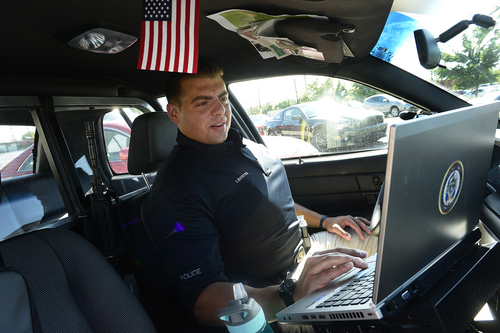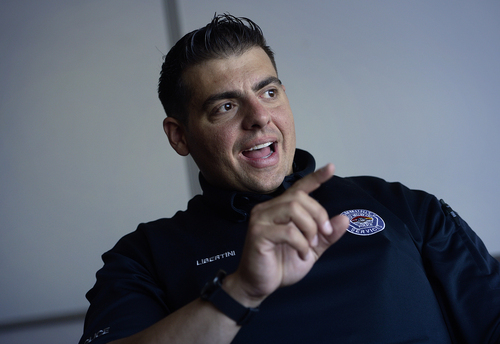This is an archived article that was published on sltrib.com in 2014, and information in the article may be outdated. It is provided only for personal research purposes and may not be reprinted.
West Valley City • The woman approached West Valley City police detective Franco Libertini with enthusiasm, like an old friend she hadn't seen in a long time.
But Libertini had never seen her before. Puzzled, he asked how she knew him.
"I hear you on the radio!" the Latina replied. "I recognized your voice."
She then invited Libertini to visit her home, seeking his advice after two break-ins — an invitation typically considered a "no-no" in Latino culture, he said.
Libertini, an Argentine immigrant, said the exchange had nothing to do with the color of his skin, but instead credits his department's focus on community outreach, such as his appearances on Spanish radio.
"The idea that you have to be a Hispanic officer to fulfill the needs of a Hispanic person is wrong," he said. "Saying if I am Hispanic, I'm going to be more effective in doing my job with Hispanics — that's not correct."
The issue of racial balance in a police force — whether a department's demographics are similar to the community it serves — has been much discussed in the aftermath of a white police officer's fatal shooting of an unarmed black teenager in Ferguson, Mo.
Closer to home, questions about race also have been raised in recent officer-involved shootings, including the Sept. 10 death of Darrien Hunt in Saratoga Springs, where an officer shot and killed the 22-year-old black man. Police say Hunt was carrying a samurai sword before shots were fired.
A recent Associated Press analysis named the West Valley City Police Department — where 5 percent of the force is Hispanic — among the "least racially balanced" in the country. A third of the city's population is Hispanic, the highest percentage in the state, according to the 2010 census.
Data provided by police show a similar racial imbalance in other Utah cities. University of Utah law professor Erika George said research suggests people feel less threatened or perceive less danger when they encounter people who appear more familiar to them.
This perception, George said, affects how secure the community feels, how cooperative residents may be with police and whether community members feel threatened by the officers themselves. Any organization — from police agencies to educational institutions to corporate board rooms — benefits from having a racially diverse workforce, she said.
"There is more innovation, more ideas, more understanding," George said. Diversity "is something that elevates us all. … I really think that adding the value of different experiences and different perspectives often leads to better outcomes."
—
Respect • Salt Lake City police Detective Rueban Torres said he feels that being Latino helps him in his job, but said it doesn't play a huge role.
"There are times when I am approached by Hispanic people, and they approach me before they approach another officer," Torres said. "I think they assume I can speak Spanish. ... Me, being Spanish-speaking, it helps out."
The Ogden Police Department's Jamie Garcia, who has been in law enforcement for nearly 22 years, said he doesn't think his ethnicity affects how he does his job or how he interacts with the community.
"Sometimes, I have a tendency to get put in a little more awkward position," he said. "I also speak Spanish, so I'm called to go help with other officers to help with Spanish. There's been a few times where I've literally had people that have made the comment, 'I can't believe you would turn your back on your people.' "
Ogden has the third-highest Latino population in the state, at 30 percent. But according to the police department, only two sworn officers — 1 percent of the police force — are Latino.
But Garcia, Torres and Libertini agree a commitment to treating citizens with respect is more important than an officer's race.
"It certainly wouldn't hurt to have a more diverse police [force]," Garcia said. "[But Ogden officers] treat people with dignity and respect, no matter their race, color of skin or ethnic background."
Libertini explained, "I can pull somebody over and that person is Hispanic. At the end of that interaction, the person is not going to care much about whether I was Hispanic. What's going to matter in the end is how I treated that person."
—
'How do I belong?' • But having a diverse police force can help build trust between officers and citizens, said John Mejia, legal director for the American Civil Liberties Union of Utah.
"It makes it easier for community members to relate to the police department," he said.
Latino community activist Tony Yapias, director of Proyecto Latino de Utah, said he believes that trust is key for law enforcement.
"If you have more officers that look like you that are serving the community, you will have an easier time dealing with them," he said. "And things might not get out of hand as we've seen in Ferguson."
George said she doesn't believe police in Utah are "overtly biased," but said unconscious bias could be a factor during encounters with citizens. That's why a diverse department is important, she said.
"In many communities, they may not feel, as a police officer, that they are treating people differently, where the community that you serve perceives that you do," she said.
University of Utah students "came out of the woodwork," she said, for a recent panel she moderated with Sybrina Fulton, the mother of Trayvon Martin. The unarmed Florida teen was killed by neighborhood watch volunteer George Zimmerman, whose controversial acquittal on a murder charge ignited a national conversation about race.
"I was really blown away by the number of students wanting to talk to her, and share their stories about how they thought they were being racially profiled," she said. "And not just young men who identified with being singled out, but there were young women in head scarves [as well.] There is this question of 'How do I belong?' 'How do I become a new American?' and feeling like they don't [belong]."
Kent Hart, executive director of the Utah Association of Criminal Defense Attorneys, said he had a similar experience teaching a paralegal class at a local community college. Very few of his white students said they felt targeted by police, he said, but nearly every minority student did.
"I do not believe this is a product of overt racism by police officers," he said. "I think police officers, especially in Utah, try to be fair. But you just can't overcome a subconscious problem that leads to racism."
In any field, having a diverse staff helps to identify issues that a homogeneous group would not have discovered alone, he said.
—
Reaching out • Libertini said West Valley City police try to build trust in the Latino community by reaching out to them in places they frequent. Officers speak about public safety on the radio, during community events and at the Mexican and Peruvian consulates. This gives community members information not only about law enforcement, he said, but also about other city matters, such as where to get a driver license or a building permit.
Yapias said the department's efforts have been crucial.
"A major issue was trust and whether we can trust the West Valley Police Department," he said. Community outreach "has been a very positive thing. ... If they [citizens] have that interaction, they'll know it's OK to call 911 and have an officer right next to you."
But one frustration for many in law enforcement is that they don't have many Latino applicants applying to be a police officer.
"You can't hire people that don't apply," West Valley City Police Chief Lee Russo said recently. "That's one of the reasons we need to continue to engage [with the community] and build trust."
Yapias said he and Russo have discussed going to schools in Salt Lake County and West Valley City to encourage young students to consider a career in law enforcement.
"We need to create an interest, and we have to start early on," Yapias said. "We can't go to college kids today and expect overnight that they'll start applying in masses."
Ogden police spokesman John Harvey said the department doesn't specifically seek minority officers when hiring. Officers who speak Spanish or another language are paid more, he said, but the job application doesn't ask for an applicant's ethnicity.
"We try to hire the best officers, regardless of what color they are," Harvey said. "... If people are purple, we don't care. It's whether you are the best candidate for the job."
Torres said it "would be nice" if the Salt Lake City Police Department had more diversity in its ranks. "I do not know why [more minorities don't apply]," he said. "This is one of the best jobs in the world. We get a chance to help people, and help out the community."
Twitter: @jm_miller





